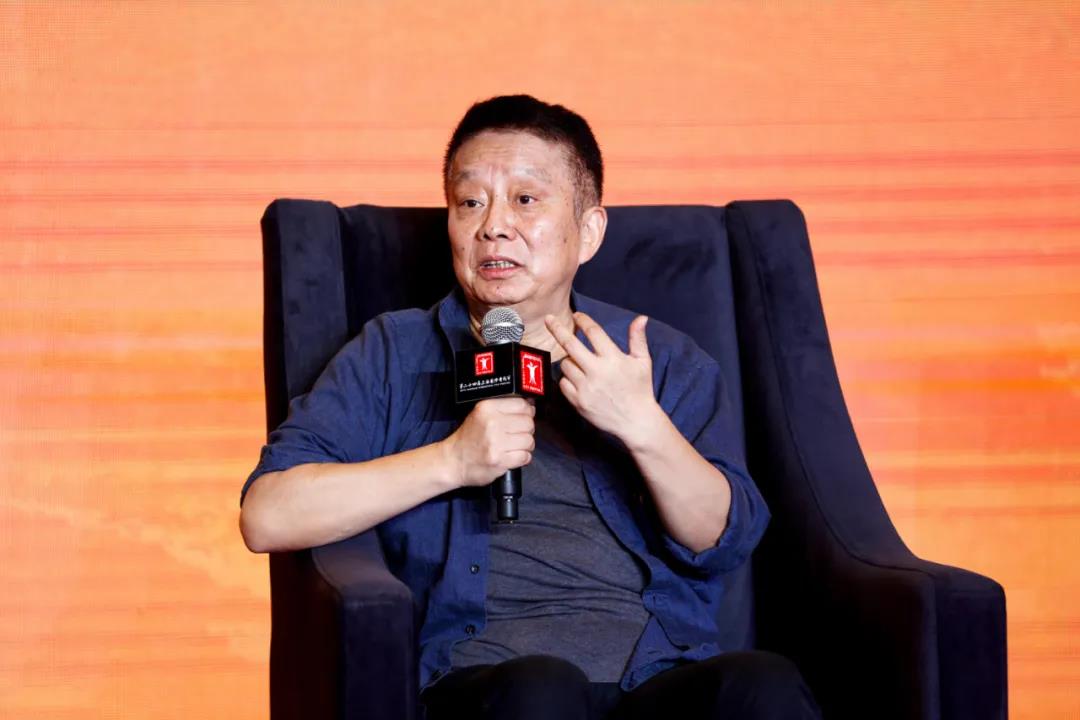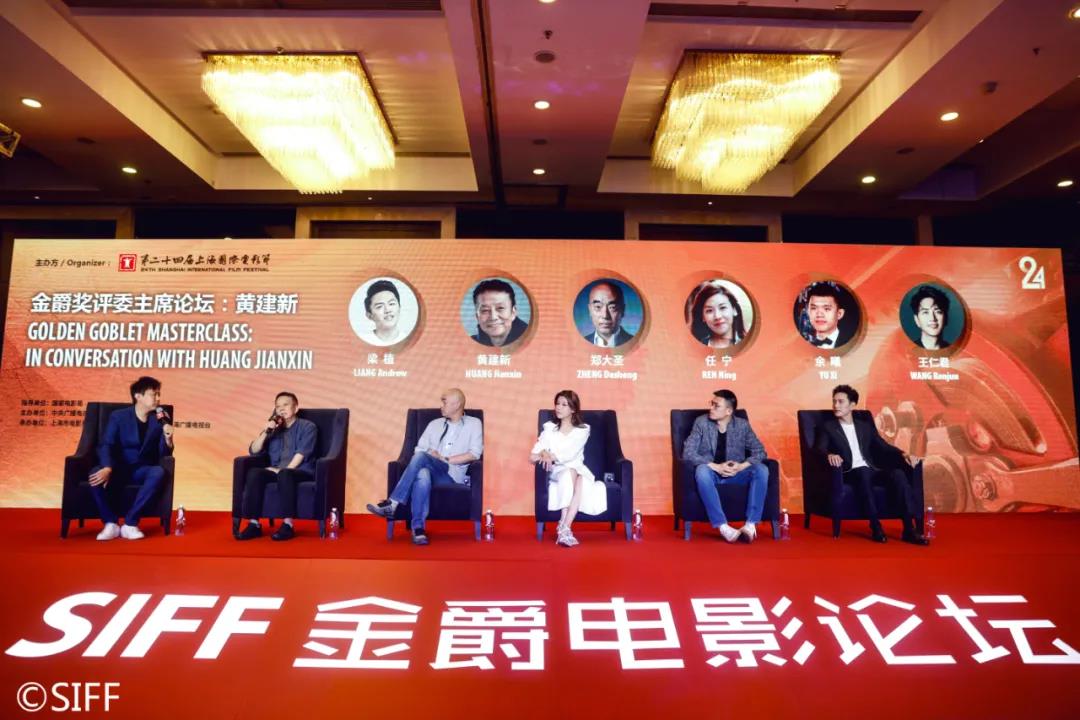SIFFORUM | Huang Jianxin: Revisit to the Historical Scenes, Shoot the Era with Novelty, and Bring out the Vigor Unique to Youth
On the screen, Mao Zedong, played by Wang Renjun, rushes on the streets of Shanghai 100 years ago. The montage technique brings the audience into his memories and beautiful longings. On the balcony, Li Da, played by Huang Xuan, shouts loudly, and the sunshine at that time symbolizes future and hope; on the red boat, it is raining, and Wang Huiwu, played by Ni Ni, holds up a paper umbrella on the bow of a major conference...At the Golden Goblet ceremony of the 24th Shanghai International Film Festival (SIFF) held a few days ago, the film "1921" was screened, and the audience erupted with endless applause after the ending. This film showing the beginning of the great journey of the Communist Party of China won the audience's approval.
This morning, the SIFFORUM of the 24th SIFF was held. The Jury President for the Golden Goblet Awards, Huang Jianxin, the director of the film "1921", the co-director Zheng Dasheng, the producer Ren Ning, and the screenwriter Yu Xi, and the leading actor Wang Renjun made a collective appearance. Director Huang Jianxin described the film "1921" as the year 1921 in 2021. "Ten years have passed since the release of Beginning of The Great Revival, we must shoot with new ideas so that we can strike a chord among young audiences."

Novelty: Cosmopolitanism gives the story a new perspective
From The Founding of a Republic to Beginning of The Great Revival, the audience are familiar with watching the grand narrative red blockbusters that was hypnotic. But ten years later, everything is different. From the "Wuchang Uprising" in 1911 to the convening of the first National Congress in 1921, Beginning of The Great Revival has portrayed numerous historical details in the span of 10 years, involving many historical figures. Huang Jianxin found it difficult to make once again a work themed on the centenary of the founding of the Communist Party of China. "In the past 10 years, the research on this period of history has become very detailed, and many new materials have appeared. We must change our perspective and express it with novelty."

In "1921", Huang Jianxin led the creative team to reveal the international background of the founding of the Communist. "After the October Revolution, the Soviets headed by Lenin promoted the practice of Marxism to the world, and there was an organization, namely the Communist International. Under such a big background, the stories that happened in China had its cosmopolitan nature." The new perspective has changed the story. "Because of the involvement of the Communist International, Japan and Vietnam forces gathered in Shanghai and there were many parallel stories, which changes the plot of the film."
For example, the film introduced a Japanese perspective, Huang Jianxin said, this is because the crew obtained particularly important information during filming. "The Japanese co-production team and our planning team found a telegram record in the archives of the Japanese Metropolitan Police Department. It recorded that on June 30, 1921, the representatives of the Communist International were going to hold a meeting in Shanghai. And Japan had obtained this news at that time.” This piece of information became an important element in supporting the plot of the film. Because Japan was afraid that the Congress would obstruct their Manchu-Mongolian policy, the film showed the process of the delegates heading off dangers before and after the “first National Congress”.

screenwriter Yu Xi affirmed the "cosmopolitanism" and "international background" mentioned by Huang Jianxin in the process of searching for information. "We discovered that the two representatives of the Communist International, Marin and Nicholsky, actually have a division of labor. The two came to Shanghai with their own work, one known and the other hidden. Marin was appointed by Lenin to come to Shanghai to observe China’s labor movement, he is the known one; Nicholsky is a Soviet member, has participated in the Red Army, fought the White Army, and was sent here to support the work in a hidden way." Yu Xi said, this setting is very similar to spy war films, as they have to avoid the pursuit of the French Concession, and the forces of European countries. A drag racing scene in the film is very engaging, adding to the mainstream theme a twist of spy war.

Reality: 1:1 restoration of the site of the First Congress of the Communist Party of China in Shanghai
Shanghai is the birthplace of the party and the origin of its original aspiration. "1921" returns to the historical scene and truly restores the scene of Shanghai that time. Chen Duxiu, played by Chen Kun, took the editorial department of "New Youth" and moved to No. 2 Lao Yuyang Li. During their stay in Shanghai, a large group of delegates stayed at Bowen Girls’ School at No. 389 Pubao Road; the first National Congress was held at Li Hanjun's brother’s residence, No. 106 Wangzhi Road in former French Concession. When the characters on the screen travel freely in Shikumen buildings, the camera naturally revolves and turns, and the audience really feels like returning to Shanghai 100 years ago.
According to the producer Ren Ning, the crew restored scenes such as the site of the first National Congress, and the second National Conference, the editorial office of the “New Youth”, and the Bowen Girls' School in Shanghai Film Shooting Base by 1:1. "Our art team started surveying and mapping on the original site of the First National Congress in 2019. The directors are very demanding. They requires, brick by brick, to reconstruct it in the original way, so that the actors and audience will get immersed immediately. In addition, the crew also went to many old buildings in Shanghai 100 years ago to shoot real scenes, including filmed Dashijie, the Long Bar, Columbia Circle, Shanghai Institutes for Biological Sciences, Changning Financial Park, and the Bund. The real display of these old buildings in Shanghai is very helpful to the faithful presentation of the film’s history. What impresses the audience the most is the breath of life in the film. There is a scene when Mao Zedong first arrived in Shanghai. Li Da and Wang Huiwu invite Mao Zedong to a dinner. Ren Ning recalled: “In that season, Shanghainese were used to setting up a table and a few small bamboo stools in the back alley in summer. The dishes they ate were not arranged randomly, but designed carefully by the directors and the art props team after discussions. In order to meet the character plot, setting and daily habits of Shanghainese," In the film, Huang Xuan played Li Da and Ni Ni played Wang Huiwu as a pair of lovers. They were newly married, and when they moved to their small house from the sojourn Chen Duxiu's house, Wang Huiwu would go back and get a small bottle of flowers. "She said ‘I had forgotten my flower, so I went up to get it.’ Why is there such a detailed setting? Because in that season, Shanghai girls often wear gardenias, so you will see that our revolutionary women also have a humane side close to life, and they are down-to-earth and genuine character. "

In a scene in the film, Li Da came to the rooftop with frustration and hesitation. In order to comfort Li Da, Wang Huiwu brought him a bowl of sweet dumplings. It turns out that this bowl of sweet dumplings from "Qiao Jiazha" has also been carefully discussed, "What kind of snacks Shanghainese often eat at that time, and this store had to exist for more than 100 years. This is not an implant. It’s the homework that needs to be done to reflect the historical reality.” Ren Ning said that there are many such details hidden in the film, and the audience can discover them one by one. This is to understand the life and culture of the city of Shanghai in the 1920s with a full-view shot turning from the trivial to the grand.
Huang Jianxin also mentioned the scene in the French Concession, "When you were in the French Concession, the car was traveling on the right. As a result, when Li Da went to the factory, he arrived at that entrance. One side is the French Concession, and the other is the public concession. And the car has to turn to the left, and we’ve brought such details.” If the audience looks closely, they will find that the film is particularly true to Shanghai at that time.
Sense of detail: as close to the character as possible
In "1921", in addition to shooting with novelty, we should be as close to the characters as possible. In order to support the plot, the film must have characters throughout the story. Director Huang Jianxin said, "When there are such characters, there will be character relationshipsa, the emotion relationships and the working relationships, and the film will begin to become a true feature film."
Many plots in the film show the delicacy of a feature film. For example, Li Da and Wang Huiwu are newly married, and their harmonious relationship conveys subtle emotions. Huang Jianxin also mentioned important "dramatic details." "After Li Da met with the international representatives, because of different opinions, he went back to the balcony to sort out his thoughts, smoked, lighted cigarettes, and Wang Huiwu came up to send sweet dumplings and asked him what he was thinking. I remembered that when I burned Japanese goods and struck a match to light the Japanese goods, I discovered that the matches were made in Japan." With such a detail, Li Da felt very sad, so he cried, and Wang Huiwu also cried. "At this time, you will feel that he has a kind of Chinese intellectual's most valuable quality, that’s sense of responsibility for the country, and that quality is brought out clearly."
The actor Wang Renjun, who once played Mao Zedong in "The Bugle from Gutian", plays the young Mao Zedong this time. There is a scene in the film. He meets a group of French people celebrating the French Independence Day in the French Concession. When he was about to enter the consulate, he was stopped by the guard, so he began to reflect and ran through the streets of Shanghai, along Nanjing Road, and the Bund. Through the montage editing, all the audience who watched the film clapped and praised the scene.

According to Huang Jianxin, when he first saw Wang Renjun, he asked him a question: "Are you good-at running, that is, could your movements meet my expectations?" Wang Renjun felt "there’s nothing difficult in running" at first. But the actual shooting overthrown his original idea. "Because the young Mao Zedong was dressed casually and his trouser legs were very loose. If you want to take your steps very vigorously and aggressively, you need to make great improvements in your movements." Later, Huang Jianxin took a video of running. Wang Renjun watched, "The legs are bounced up, very much like the state of the triple jump. In fact, I am uncomfortable during the run, but the scene is very pleasing to the eye."
Youthfulness: the power of youth is vigorous and encouraging
In "1921", passionate young people from all over the country, with an average age of only 28, reproduce the story of the story of struggling to create a new China. "It took only 28 years for such a group of young people to change the attributes of China that had lasted for thousands of years. What a powerful force." In Huang Jianxin's eyes, these young people are full of vigor. "We always talk about the vigor unique to the young. That is an upward force. In fact, youth is like this."
It is the sense of youth running throughout the film that makes young audiences feel it particularly intimate. Wang Renjun also found the director’s good intentions after watching the finished film. The film was to restore the youth image of leader Mao Zedong. "He doesn’t want to implant Mao Zedong’s foresight into his youth. His image in youth is a passionate young man, full of enthusiasm, ideal, braveness, and daring to explore and be the first."

The film’s co-director Zheng Dasheng added: “100 years ago, they were all little-known young people. What we want is a living character. Director Huang will especially encourage the actors to improvise, and he is especially willing to see your improvisational sparks at the scene." Director Zheng Dasheng still remembers the moment of surprise in front of the monitor. "The actor needs to exchange his soul with the role. To make a movie is to capture the soul, the actor and the role are merged into one. At that moment, you feel that it is a gift for us to make movies."

And this living youthfulness does not only exist in the main characters. When filming the "May 4th Movement" scene, the producer Ren Ning discovered based on data that there were four girls from Beijing Women's Normal School who were very famous in the "May 4th Movement" and were called "May 4th Young Masters." Director Huang Jianxin thinks that similar college students should be found, "Being 20 years old, their eyes and their simplicity are unique, because they have not experienced the various complex ups and downs of society, so their eyes are bright and clear. "So, the crew has found a group of first- and second-year college students who are among the best in the college entrance examination in Beijing Film Academy, The Central Academy of Drama, Shanghai Theater Academy and other art schools. "These real college students are different. When they walked over in that parade, when the camera zoomed in on their eyes, they made people sense the air of youth."







